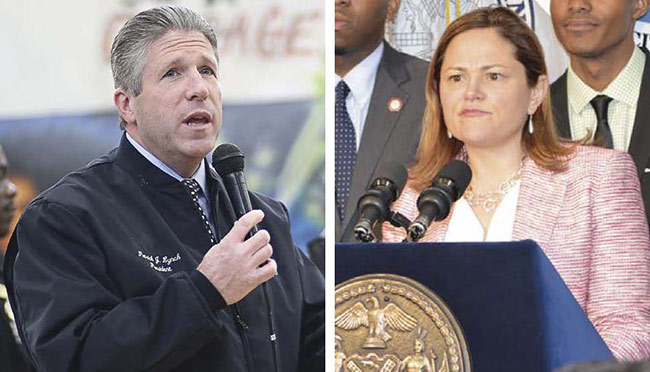





At their last meeting under outgoing Speaker Melissa Mark-Viverito, City Council Members passed two controversial bills requiring that officers give out business cards identifying themselves to many people they stop and record their consent for searches. The measures managed to leave both the city’s largest police union and police-reform advocates complaining.
Ms. Mark-Viverito had blocked the two bills, together known as the Right to Know Act, for years. The NYPD incorporated some of their provisions into its administrative rules.
Changes Spurred Protests
She allowed a vote after the first bill was amended in an agreement among the Council, the Mayor’s Office and the NYPD to exclude many searches—despite the opposition of police-reform groups and many Council Members.
“This legislation reflects nearly four years of thoughtful, serious negotiations,” she said in a statement before the vote, “and strikes a fair compromise between enhancing community relations and making sure NYPD officers are able to effectively do their jobs and keep New York City safe.”
The Patrolmen’s Benevolent Association strongly opposed the legislation. The union’s president, Patrick J. Lynch, said that in approving the bills, the Council “chose politics over public safety.”
He continued, “As we’ve said from the beginning, the ‘Right to Know’ bills will discourage police officers from proactively addressing the threat of crime and terrorism—a threat that is no doubt growing based on recent events. The PBA had zero input on the revisions to this legislation, and if the Council really didn’t want to discourage officers from exercising discretion and policing proactively, they would have abandoned these misguided bills altogether.”
‘Stuck With New Burdens’
He said, “Policymakers are saddling police officers with new burdens and conflicting directives, without any regard for the impact at the street level.”
He concluded, “With this legislation, our city leaders have failed all of us.”
The compromise on the search bill exempted stops that are not made on the basis of an officer suspecting criminal activity. It thereby excluded Level I encounters, defined by the NYPD Patrol Guide as those based on an “objective credible reason to approach” (defined as “more than a hunch or whim”) but not on suspicion of criminality.
Two police-reform advocates on the Council, Jumaane Williams and Brad Lander, said in a statement that this means “the majority of police-civilian stops, as well as traffic stops” are not covered under the bill.
“Removing these provisions strikes at the heart of what the original Right to Know Act aimed to accomplish,” they said.
Families Opposed
During Council debate, Mr. Williams said the families of people who have died in police encounters, including Sean Bell, Eric Garner and Ramarley Graham, opposed the change.
“Let’s be clear: the most common interactions between police and my constituents are Level I and traffic stops, whether the data shows it or not,” said Council Member Donovan Richards, who represents a largely black district in Southeast Queens.
“This version of the bill eliminates the most essential protections for New Yorkers in the majority of policing interactions, and has been advanced with only the support of those who obstructed it for the past four years,” said Communities United for Police Reform. “It isn’t sweeping, it isn’t reform and it isn’t progress.”
It’s a Start
The bill’s lead sponsor, Ritchie Torres, argued that the revised bill was still a valuable start. “Progress in the present does not foreclose the possibility of even more progress in the future,” he said.
Mr. Torres said he was concerned that if traffic stops were covered under the bill, police unions could encourage cops to give out tickets in cases where they would have previously issued warnings.
The search bill would require officers to explain to individuals “using plain and simple language” that they have a right to refuse to be searched, except in cases where there’s a firm justification for doing so. Officers would need to have proof that a subject consented, through either a body-camera recording or a signed release.
The identification bill passed 27-20. The search bill passed 38-12.
A Bloomberg Carryover
The bills were introduced at a time when then-Mayor Michael Bloomberg was relying on hundreds of thousands of stop-and-frisks a year as a way of bringing down crime. A Federal Judge ruled in 2013 that the way the city used stop-and-frisk was unconstitutional and racially-based. Since then, the number of stops has plummeted, removing some of the urgency behind the bills. Crime has continued to decline.
Mayor de Blasio said the day the bills passed that he would sign them. “These bills are fair,” he explained.